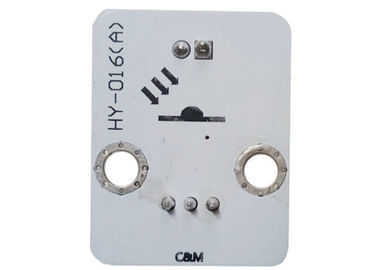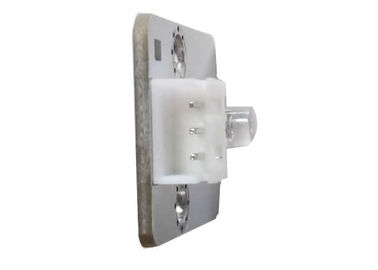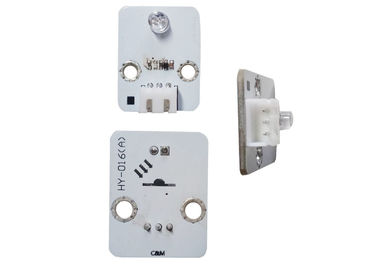XH2.54 3 PIN Ambient Ligh Sensitive Photo LDR Sensor Module For Arduino Tutorial Analog Output
Product Details:
| Brand Name: | UCHI |
| Model Number: | HY-016(A) |
Payment & Shipping Terms:
| Minimum Order Quantity: | 1000PCS |
|---|---|
| Price: | Negotiable |
| Packaging Details: | Bulk |
| Delivery Time: | 2 weeks |
| Payment Terms: | T/T, Western Union |
| Supply Ability: | 1KKPCS Per Month |
|
Detail Information |
|||
| Type: | Photo Sensor | Connector: | XH2.54 3PIN |
|---|---|---|---|
| Signal: | Analog | VCC: | +3.0V -5.5V |
| Color: | White | MOQ: | 1000PCS |
| Highlight: | photo conductive cell,light dependent resistor |
||
Product Description
XH2.54 3PIN Ambient Ligh Sensitive LDR Photo Sensor Module For Arduino Tutorial Analog Output
Description
The photosensitive sensor is sensitive to ambient light, generally used to detect the brightness and light intensity of the surrounding environment, and can sense the light source in a fixed direction. It is connected with the controller and can read the ambient light intensity, and can be made into a photoelectric switch.
The HY-016(A) contact image sensor (CIS) module integrates a red LED light source, lens and image sensor in a compact housing. The module is designed for document scanning, mark reading, gaming and office automation equipment applications and is suitable for scanning documents up to 216 mm wide. An analog video output achieves a scanning rate of 346 sec/line. The HY-016(A) module employs proprietary CMOS image sensing technology from UCHI to achieve high−speed performance and high sensitivity.
Specification
Name:Photosensor
Power:+3.0V -5.5V
Signal:Analog signal
Connector: XH2.54 × 3
Pin:S-Signal,V-VCC,G-Ground
Instructions for use: Connect the power supply and read the analog quantity of the signal pin to know the light intensity.
Light Sensor Module Quickstart Guide (ref details from freetronics.com.au)
The Light Sensor Module provides a very simple analog output, so all you need to connect it to your Arduino or compatible board such as the Eleven is GND, 5V, and one analog input. On a 3.3V microcontroller such as Freetronics EtherDue or Arduino Due, VCC should be connected to 3.3V instead of 5V.
The module actually accepts any power source (VCC) between 3.0 and 5.5Vdc. Output voltage will vary between 0V and slightly less than VCC.
You can use whichever analog input suits you best, but for this example we'll use A0:
![]()
That's it! Couldn't be much easier.
The code is very simple as well. Just perform an "analogRead()" call on the appropriate input to get a value between 0 and 1023 that represents the light level being detected. Copy and paste the following code into a new sketch in the Arduino IDE, compile it, upload it to your Arduino, and then open the serial monitor with the baud rate set to 38,400bps:
int lightLevel;
void setup()
{
Serial.begin(38400);
}
void loop()
{
lightLevel = analogRead(A0);
Serial.println(lightLevel, DEC);
delay(200);
}The light level will be reported five times per second via the serial console.
Applications
• Currency Verification
• Document Scanning
• Mark Readers Including Balloting, Test Scoring and Gaming
Machines
• Office Automation Equipment
Features
• Small Form Factor
• USB Hardware Interface
• Intuitive GUI Software
• Protective Plastic Case
• 100mil spaced test points for easy experimentation with external controllers
• Light Source, Lens and Sensor are Integrated Into a Single Module
• Analog Output
• Red LED Light Source
• Wide Dynamic Range
• Low Power
• Light Weight 2.1 oz Packaging
• These Devices are Pb−Free, Halogen Free/BFR Free and are RoHS Compliant
FAQ
| 1. I have just placed an order, When do I get courier details? |
| Around 6 PM you will get email containing courier details you can track. |
|
2.Want to Buy directly from office? |
| Please make sure you email us the list if its long, else communicate by phone about 1-2 items so we can check availability and inform what time you can come for pickup up. "In Stock" status of items on site does not mean its in ready to pickup condition. We may need time to test and make it ready. |
|
3.Do you have any dealers in my city? |
| As per our business model, we have decided to sell directly to customers without dealers. You can place order on website and we will send courier to your address. |
| 4.Do I need credit card to place order? |
| No, You do not need credit card or online bank to place order. You can instead use offline payment option as bank cash deposit option once order is created. |
| 5.Can you customize your products to suit my needs? |
| No, We do not provide customization of products. |
| 6.I want to discuss particular project of mine, Can you guide which products to buy? |
| No, We cannot suggest products Please understand the product documentation and see if that product suits your requirement. |
When you think of displays, what do you think of ?
Traditionally interpreted as a part of televisions and computers, display technology is now everywherefrom
thermostats, handheld terminals, automotive infotainment systems, automotive clusters, to electronic point of sale machines (EPOS) and more. People like the display to be lit comfortably so it is easy to see and not strain the eyes. In many of these applications, ambient light sensors (ALS) are used to set the display rightness based on the surrounding light conditions. Depending on the environment a
product is designed to be used in, the problems present in designing an ambient light sensor into these
products are trying to match human eye response,reaching the correct IR rejection due to conditions
under dark glass, and maintaining long battery life.UCHI provides not only the OPT3001 to
solve these problems, but also the OPT3001-Q1 that is an automotive qualified device to be used in
infotainment systems.
A problem with display backlights in portable electronics is the need to provide a clear picture in all
ambient light conditions while simultaneously optimizing the power consumption to preserve battery
life. The same problem occurs with display backlights in stationary applications, such as thermostats, but the environmental conditions are varied. Stationary applications must provide a clear picture in a variety of
light conditions, like florescent light, incandescent light, or no light at all. Ambient light sensors from TI are
being designed into products such as these to provide information to the display about the ambient light level surrounding the display. This light level can then be used to automatically adjust the display brightness via the backlight, providing just the right brightness level for clear viewing, preserving power and avoiding end user frustration that the display is too bright or too dim.







